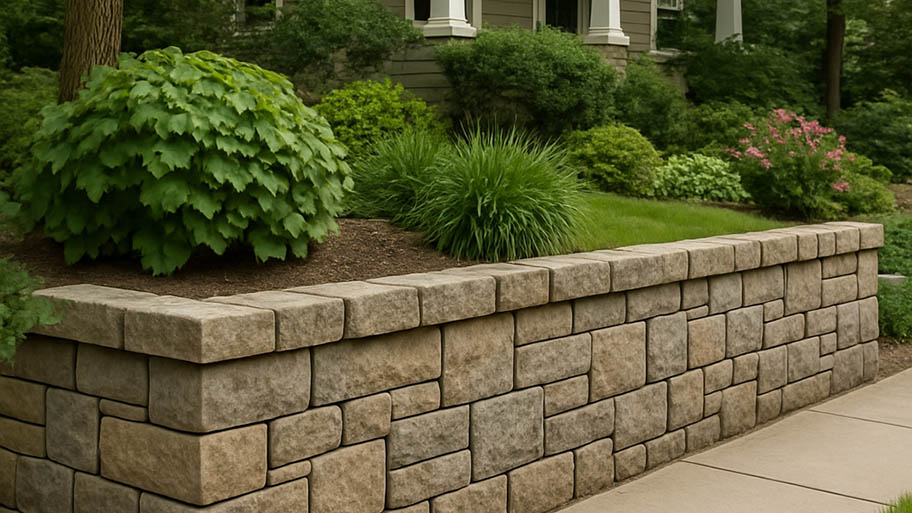
Kick erosion to the curb with an eye-catching retaining wall. Retaining wall costs vary based on the material, but this guide will help you budget.
Pavers and hardscaping service costs depend on your project and location. Check with a local pro for your specific job.
Expect to spend at least $480 on a small paver patio, but your final cost depends on size, material, and complexity.
Natural stone pavers are significantly more expensive than concrete or brick.
Specific designs, like mosaics, require more time and effort, increasing the cost.
Unless you have soft, workable soil, budget a few hundred dollars for site prep and excavation.
You can DIY, but expect to spend over 50 hours on the job and be ready to do some heavy lifting.
The average paver patio cost is around $3,800 for a 280-square-foot patio, but prices can range from $480 to $22,500 depending on factors like size, design, paver quality, and add-ons. Depending on the project's size, labor, material, and design complexity, you could pay anywhere from $8 to $50 per square foot.
While functional, a concrete slab patio can leave your outdoor space looking a little lacking. Investing in the extra paver patio cost gives you tons of color and style options that can help bring your space to life. Pavers cost more than their concrete alternative, but their durability and style make them worthy of the splurge.
Your paver installation cost will typically range from $8 to $25 per square foot, so the size of the patio is one of the biggest cost factors. Prices for flagstones or other high-end materials might be as much as $50 per square foot. Below is a paver cost estimator based on some of the most common patio sizes.
| Square Footage | Average Range | High Cost |
|---|---|---|
| 6x10 (60 sq. ft.) | $480 – $1,500 | ~$3,000 |
| 8x12 (96 sq. ft.) | $768 – $2,400 | ~$4,800 |
| 10x10 (100 sq. ft.) | $800 – $2,500 | ~$5,000 |
| 10x16 (160 sq. ft.) | $1,280 – $4,000 | ~$8,000 |
| 10x20 (200 sq. ft.) | $1,600 – $5,000 | ~$10,000 |
| 14x20 (280 sq. ft.) | $2,240 – $7,000 | ~$14,000 |
| 20x20 (400 sq. ft.) | $3,200 – $10,000 | ~$20,000 |
| 24x24 (576 sq. ft.) | $4,608 – $14,400 | ~$28,800 |
| 25x30 (750 sq. ft.) | $6,000 – $18,750 | ~$37,500 |
| 30x30 (900 sq. ft.) | $7,200 – $22,500 | ~$45,000 |
Concrete, natural stone, and brick are the three main materials to choose from when building a paver patio. Here’s what to know about their costs and characteristics.
| Paver Material | Pavers Cost Per Square Foot | Details |
|---|---|---|
| Concrete | $8–$15 | Comes in several styles, textures, and colors, also called “slate concrete pavers” |
| Natural Stone | $15–$50 | Earthy colors, unique, long-lasting, hard to clean, and may discolor over time. |
| Brick or Clay | $10–$20 | Easy to maintain, but can chip or crack easily |
The cost to hire a professional paver installer is $50 to $80 per hour or $4 to $11 per square foot, and will significantly impact the total cost of your patio project. The average time for professional completion of a 300-square-foot patio is between 35 and 40 hours, depending on the complexity of the project, design, and other job specifics.
If you hire a local landscape designer for your new patio, expect to spend between $1,930 and $7,230 to cover the cost of landscape design. However, many paver installation companies will include the design cost in their price estimate and contract.

From size and style to installation obstacles, many variables can affect the cost of installing a paver patio. Below, we’ll discuss the main factors that could have an impact on your paver patio cost.
Basic paver patio designs follow a simple, continuous pattern, such as herringbone or running bond. More intricate paver patterns, such as mosaics or spirals, require extra skills and planning. These types of designs will drive up costs for labor and may require the use of more expensive materials.
While the look of your pavers is a major consideration when it comes to the type you install, you should consider the climate in your area as well. “Other factors to consider when selecting pavers include weather patterns, i.e., are you going to have to shovel snow in this area? If so, a crushed rock patio is not ideal,” says Tara Dudley, Angi Expert Review Board member and owner of Plant Life Designs. “Is it going to be in a sunny area or a shady area? Natural stone tends to weather more in a shadier location, so pavers would be a good choice! Another thing to consider is the type of furniture you plan to use on the patio and how it will sit on the stones.”
If your patio site is more challenging to access, it may incur extra labor charges. For example, if rocks or other obstacles make it difficult to maneuver the wheelbarrow or machinery around, this could tack on more hours to your overall labor cost.
Also, a patio that’s easy to back a truck up to and unload the supplies will generally cost less than a patio where pavers, flagstones, or bluestones need to be wheelbarrowed to the site.
If there is challenging terrain to work with, such as plants, tree roots, and hard soil, your job will carry higher costs for site preparation and excavation. Sites with soft, workable soil and few or no obstacles will cost the least.
If you’ll be adding extra features to your patio, like railing and fencing, be sure to budget extra for the additional materials and labor to install them. For example, the cost of a new patio railing could range from $20 to $600 per linear foot.
The cost of building a roof over your patio depends on what type of structure you wish to add. Prices can range from $4,000 for a pergola design to over $30,000 for a full gable-roof style installation. While adding a roof represents a significant project cost increase, the benefits of added protection from the sun and weather often make the investment worth it.
Proper drainage beneath your new patio is essential in locations where you need to manage rain and snow runoff. Many municipalities require adding appropriate drainage materials underneath new patio installations. Geotextile fabric, bedding sand, and gravel are often necessary for this purpose and cost between $0.10 and $1 per square foot to install.
Sealing your patio pavers will cost around $200 to cover up to 1,000 square feet. This step will help preserve the beauty of your pavers by creating a protective barrier against stains and water damage, so it’s a wise investment to make.
Check with your local municipality or HOA before building a new paver patio to see if you need a permit. You’ll likely need one if you plan on investing in the cost of an outdoor kitchen or similar project in the future.
Installing a paver patio requires exceptional math skills, heavy lifting, and landscaping work. Altogether, you can expect this project to take between 40 and 50 hours. If you’re uncomfortable with any of that (no judgment—it’s hard work!), we suggest hiring a brick paver company near you instead.
Here are some of the biggest reasons to hire a pro to lay down your paver patio:
Professionals have the right tools and equipment to install a paver patio correctly.
Experts know how to calculate and order the right number of pavers for your project.
Pros have experience with leveling, excavating, and preparing a foundation—all of which are essential for proper paver patio installation.
They also understand the best way to design a paver patio and lay out the pavers in an aesthetically appealing way.
Experts are less likely than DIYers to make mistakes, which can lead to pooling water, shifting pavers, wasted materials, and other issues.
Pros can work quickly and efficiently to finish the job faster than inexperienced homeowners.
They know how to dig without hitting gas lines or plumbing systems.
Reputable professionals have insurance and warranties to cover themselves and their work.
If you’re eager to install your own paver patio, here are some of the steps you’ll have to take:
Locate underground utility lines
Design the patio
Calculate how many pavers and other supplies you’ll need
Mark the layout
Check the slope
Excavate the area
Tamp the base
Add landscape fabric, gravel, and paver sand
Lay the pavers
Install edging
Fill the gaps with sand
Repairing your existing patio is an option in cases where cracked or missing pavers are the main problem. However, if the problems with the existing patio are deeper than that, you may need to replace it.
Repeated leveling problems, excessive cracking, or both signify a problem with the bedding material or changes to the location from things like tree root growth. Similar considerations apply to concrete patios with excessive cracking. These problems are only repairable by removing the existing patio.
If it's possible to repair your patio, you can save significant money over replacing it. However, it may be hard to find pavers or stones that match your existing ones, as manufacturers change styles and colors often. Also, the weather can alter the appearance and texture of your existing pavers.
Removing and installing a new paver patio eliminates poor bedding and color and style-matching problems. However, a new patio will cost more than repairing an existing one.
Here are a few savvy ways to save money on your paver patio cost.
Find a brickyard and buy pavers in bulk
Search for factory-direct paving prices
Hire a landscaping company to do ground prep before the installation
Do simpler projects like sealing your pavers yourself
Choose a more affordable style of paver
Keep the design simple to keep labor costs down
Compare quotes and hire a pro to do it right the first time
Adding hardscaping, such as a freestanding paver patio, can net a return on investment (ROI) of between 20% and 30% while adding one directly adjacent to your house at an entryway can add up to 80%. Additionally, installing a high-quality patio adds selling appeal for potential home buyers. As a bonus, adding a patio won't have a large impact on the tax value of your home, making it an attractive investment over installations like an outbuilding or garage.
Let your pro know how you plan to use the space (for example, for a hot tub or outdoor kitchen) so they can design it for that purpose.
Talk to the pro about which paver material—concrete, natural stone, or brick—fits your budget and style preferences.
If you prefer a more intricate patio design (like a mosaic) over a basic one, tell your pro ahead of time.
Ask the pro what you can do to prepare the site before they arrive.
Home is the most important place on earth, which is why Angi has helped more than 150 million homeowners transform their houses into homes they adore. To help homeowners with their next project, Angi provides readers with the most accurate cost data and upholds strict editorial standards. We extensively research project costs to develop the pricing data you see, so you can make the best decisions for you and your home. We rely on reputable sources, including the U.S. Bureau of Labor Statistics, academic journals, market studies, and interviews with industry experts—all to ensure our prices reflect real-world projects.
Want to help us improve our cost data? Send us a recent project quote to [email protected]. Quotes and personal information will not be shared publicly.
From average costs to expert advice, get all the answers you need to get your job done.

Kick erosion to the curb with an eye-catching retaining wall. Retaining wall costs vary based on the material, but this guide will help you budget.
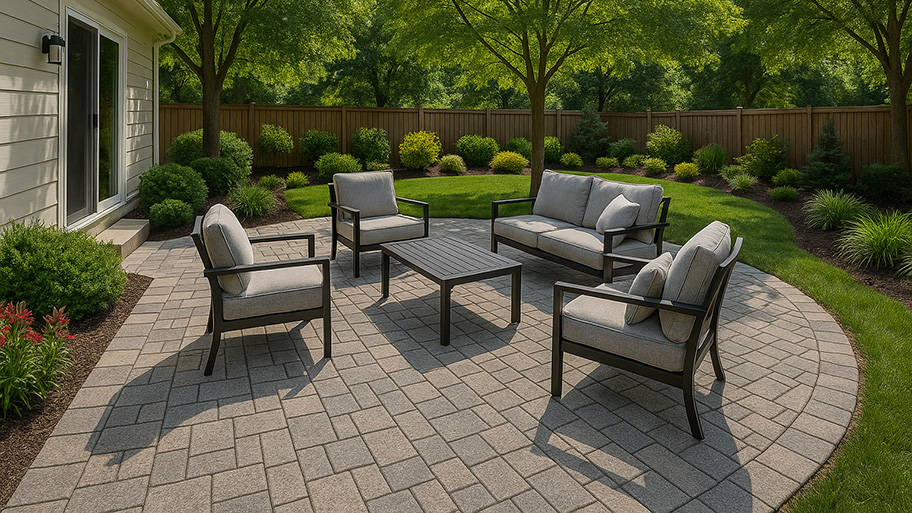
Thinking about installing concrete or brick pavers for a walkway or patio? Learn the cost of interlocking pavers in this informational guide.

Pea gravel is a good-looking, versatile landscaping stone that's a favorite of the pros. Read about how much pea gravel costs for both installation and the stone itself.
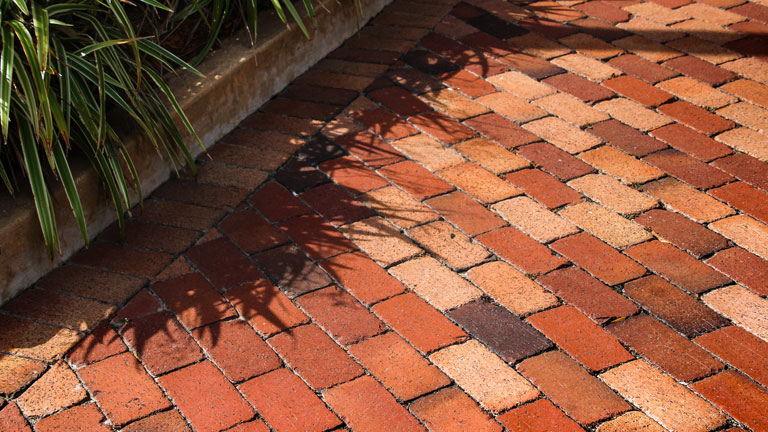
Discover the cost to install brick flooring in your home. Learn about installation, materials, labor, and ways to save on your next brick flooring project.
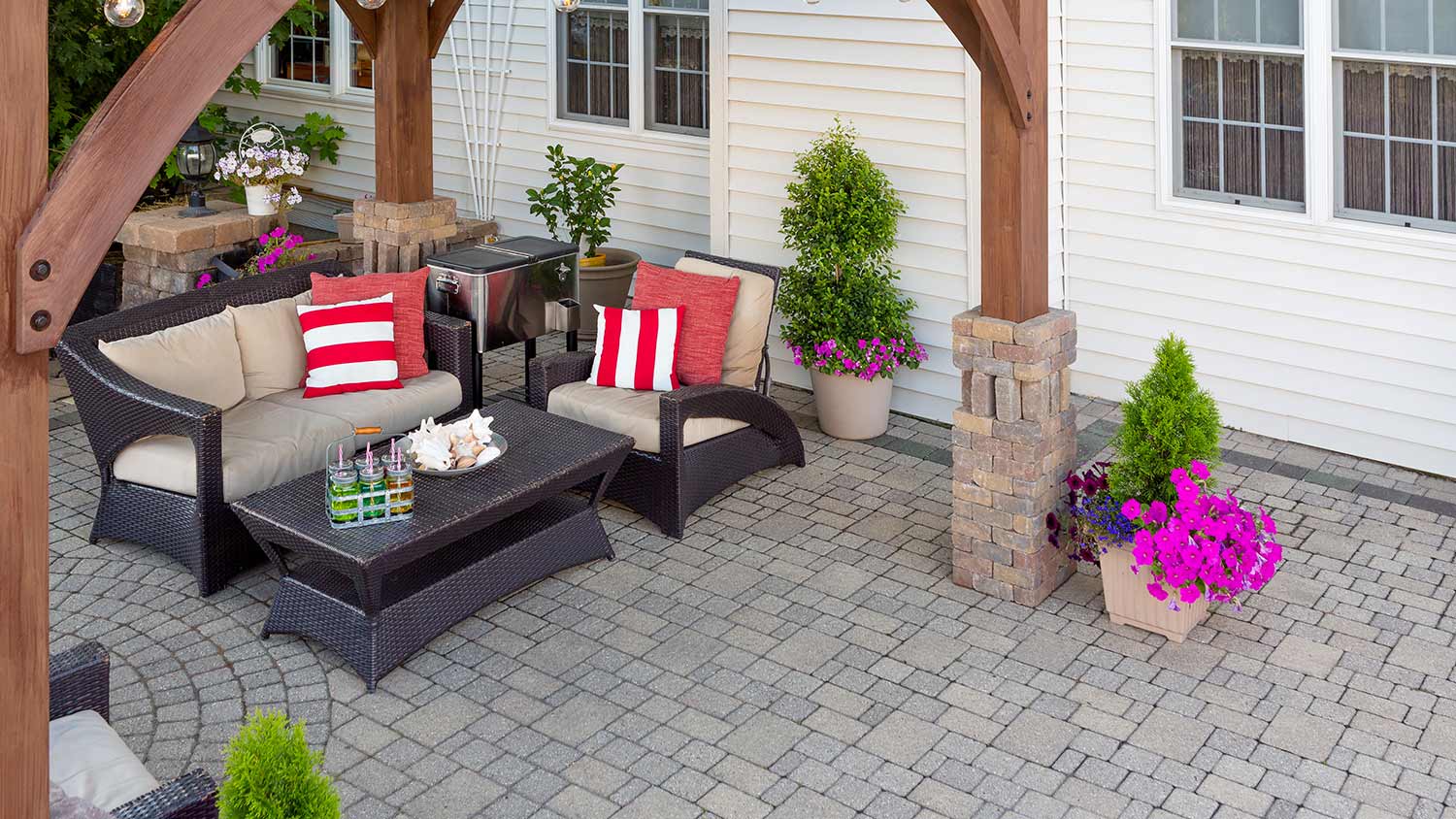
Discover travertine pavers costs to learn about installation, materials, and labor prices, plus tips to save on your travertine paver project.
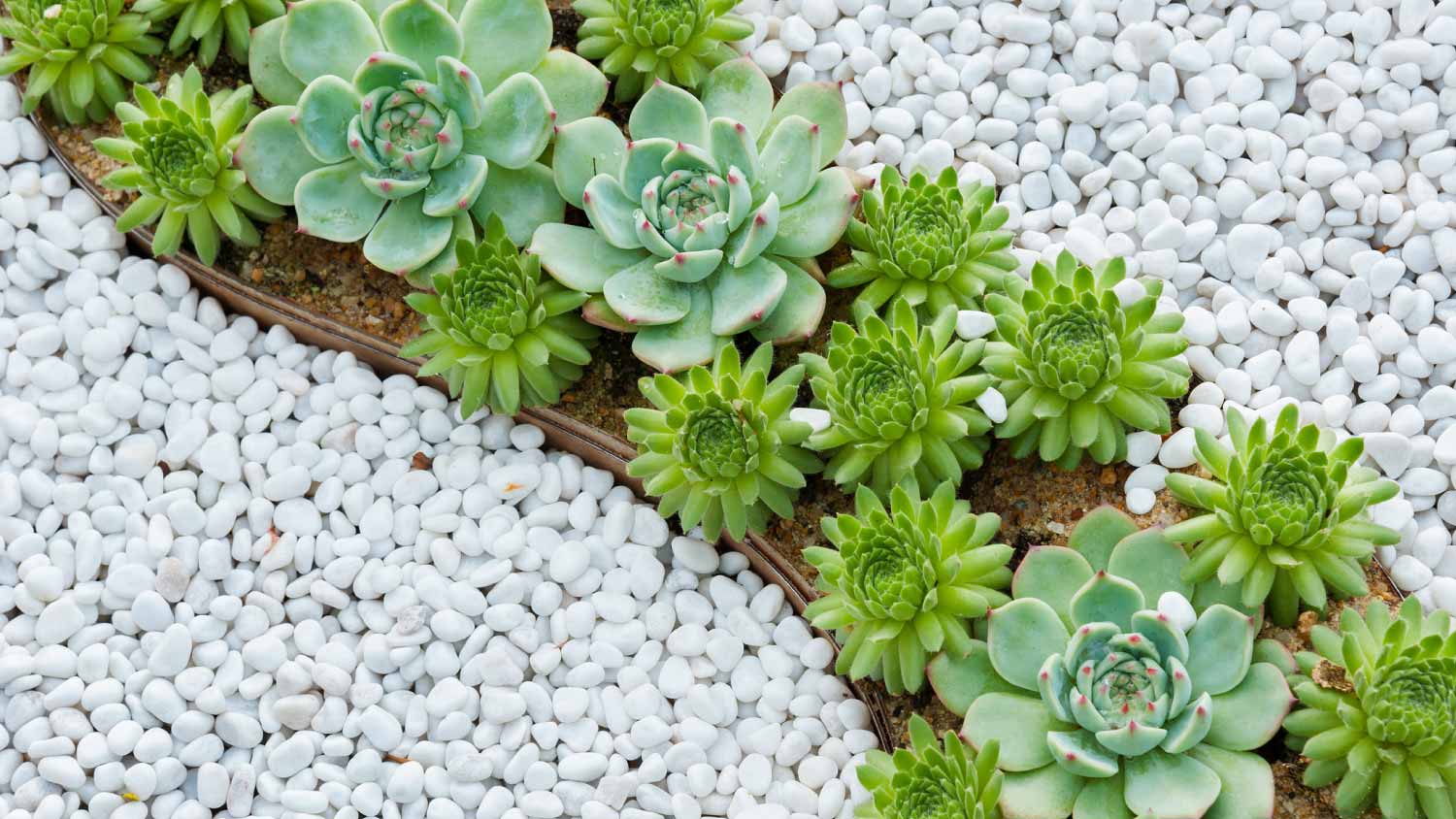
Wondering who to hire for xeriscaping? Learn when to call a landscaper, designer, or architect, and see how pros build water‑wise yards.